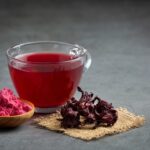
In this article, we explore ginger benefits and side effects to help you understand how this popular spice can affect your health.
People often use ginger (either fresh or dried) in cooking, herbal tea, or as supplements for its health benefits. Ginger comes from the Zingiber officinale plant and has been used in Chinese and Indian medicine for thousands of years.
It’s a spice native to Southeast Asia and is related to other spices like cardamom, turmeric, and galangal. It has a strong flavor that can be peppery, slightly sweet and aromatic.
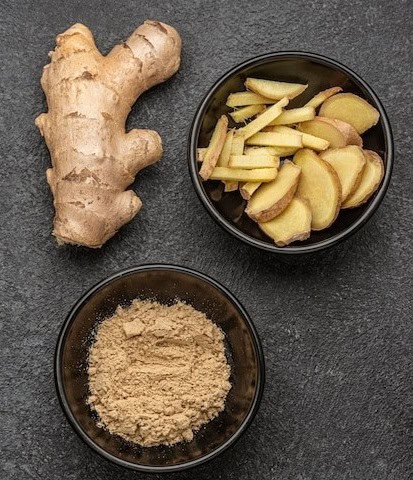
The part of the ginger plant that we use is called the rhizome, which is also known as ginger root. You can use ginger in different forms, such as fresh, dried, powdered, or as oil or juice. It’s common in many recipes, home remedies, and beauty products.
Ginger can help with nausea, vomiting, and indigestion. Its unique smell and taste come from oils, particularly gingerol, which is responsible for many of ginger’s health benefits.
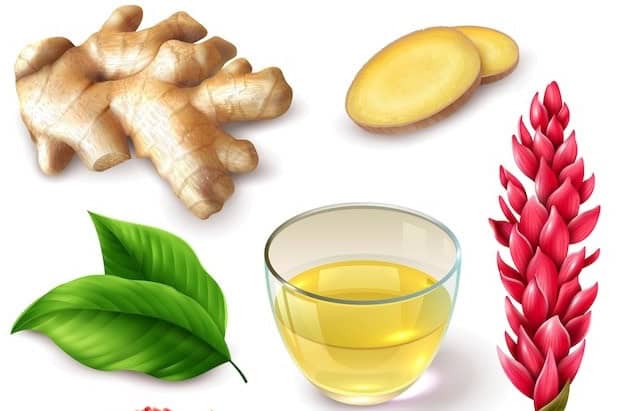
Most research on ginger benefits and side effects has focused on dosages ranging from 250 milligrams (mg) to 1 gram, taken one to four times daily. The Food and Drug Administration (FDA) considers ginger root generally safe and recommends a daily intake of up to 4 grams.
Ginger is rich in antioxidants but doesn’t provide many vitamins, minerals, or calories. According to the Department of Agriculture, 2 teaspoons of ginger contain just 4 calories and no significant amount of any nutrient.
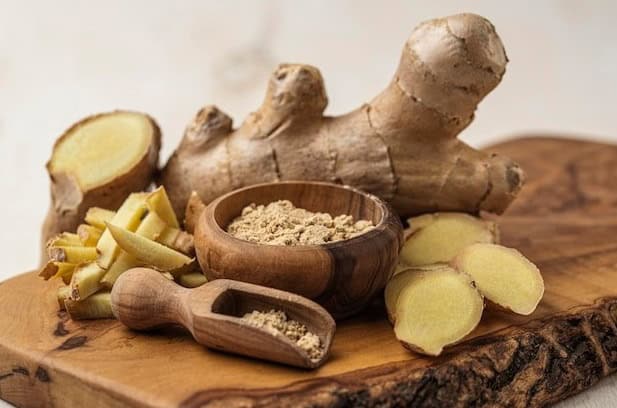
Ginger might help with nausea, including morning sickness during pregnancy. It may also relieve nausea and vomiting for people having certain surgeries or undergoing chemotherapy according to a 2020 study.
While several studies on ginger’s benefits and side effects suggest that ginger is generally safe, it’s a good idea to consult a doctor before taking large amounts if you’re pregnant. Ginger may not be suitable for those close to labor, with a history of pregnancy loss or bleeding, or those with clotting disorders.
Several research on ginger shows that gingerol has strong anti-inflammatory and antioxidant effects.
For example, it may help lower oxidative stress, which happens when there are too many free radicals in the body.
Medical researchers also recommend more studies to determine the best doses and types of ginger extract to use.
Similarly, a 2015 review found that taking ginger by mouth is “modestly effective and reasonably safe” for treating inflammation from osteoarthritis. However, the researchers pointed out that the studies they analyzed were small and might not apply to everyone.
Animal studies indicate that the antioxidants and bioactive compounds in ginger can reduce inflammatory responses in the brain, potentially helping to prevent cognitive decline. Oxidative stress and chronic inflammation are thought to play a significant role in Alzheimer’s disease and age-related cognitive decline.
However, research on ginger’s benefits and side effects shows that it contains compounds like 6-shogaol and 6-gingerol, which might help prevent degenerative diseases such as Alzheimer’s, Parkinson’s, and multiple sclerosis.
Ginger may improve digestion by increasing movement through the digestive tract, potentially preventing constipation. It seems to positively affect pancreatic lipase, an enzyme that aids digestion in the small intestine.
Functional dyspepsia, which involves symptoms like belching, nausea, abdominal pain, bloating, and fullness without a clear cause, often occurs with irritable bowel syndrome (IBS) and could also be managed by ginger.
Likewise, according to a study on ginger benefits and side effects, consuming ginger and artichoke preparation taken before a main meal significantly improved indigestion symptoms in people with functional dyspepsia compared to a placebo.
There is also some evidence that ginger may benefit heart health. A study found that consuming ginger daily protects against various cardiovascular conditions like high blood pressure.
Another study showed that ginger extract reduced heart abnormalities in diabetic rats, likely due to its antioxidant properties.
Some researches suggest that ginger might help manage blood sugar levels as well.
Studies on ginger benefits and side effects in both humans and animals suggest that ginger might aid in weight loss. Ginger might help with weight loss through various mechanisms, including its potential to lower inflammation.
A research found that ginger supplements significantly reduced body weight, waist-hip ratio, and hip ratio in people who were overweight or obese.
Many people use ginger to help recover from a cold or the flu, although the evidence for this is mostly based on personal experiences. Ginger contains properties that fight infections. A certain study found that fresh ginger might help protect the respiratory system from certain viruses, while dried ginger did not have the same effect.
Another study suggested that daily ginger consumption might support the immune system, potentially protecting against chronic diseases and aiding recovery from illnesses like the common cold or flu.
Ginger might help relieve menstrual pain, also known as dysmenorrhea. This could be through the anti-inflammatory and pain-relieving effects of its gingerol compounds. Some research on ginger benefits and side effects suggests that ginger could be as effective as acetaminophen/caffeine/ibuprofen (Novafen) for easing this type of pain.
A research discovered that consuming ginger significantly lowered triglycerides and LDL cholesterol while increasing HDL (good) cholesterol. Even small doses of less than 1,500 mg per day were effective.
note that adding such high doses of ginger into your diet might be challenging, especially if you don’t enjoy its taste.
Ginger’s antimicrobial properties might make it helpful in fighting bacterial and fungal infections.
Lab studies on ginger benefits and side effects have shown that ginger may be effective against Escherichia coli (E. coli), which can lead to intestinal infections; Candida albicans (C. albicans), responsible for fungal infections in the mouth, vagina, and other areas; and Staphylococcus aureus (S. aureus), which causes various diseases.
Although many studies on ginger concentrating on cancer risk haven’t involved humans, research shows that ginger is a rich source of antioxidants.
These antioxidants can reduce oxidative stress, which occurs when too many free radicals build up in the body. This buildup can cause cellular damage, potentially leading to conditions like rheumatoid arthritis, heart attacks, chronic inflammation, and cancer.
A recent study suggested that ginger might be effective against certain gastrointestinal cancers by inhibiting cancer cell growth or promoting cancer cell death. However, more research is needed to confirm these effects in humans.
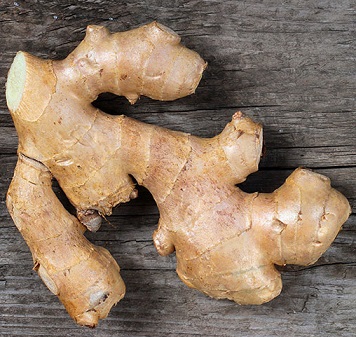
Ginger is generally safe for most people when consumed in moderation. However, in large doses, it can cause symptoms like:

While ginger is likely safe during pregnancy and breastfeeding, it’s best to consult a healthcare professional first. The FDA considers ginger safe as a food, but it does not regulate its use as a medicine or supplement. Many of the compounds in ginger haven’t been thoroughly studied, and not all claims about its healing properties are scientifically supported.
Before adding more ginger to your diet or taking a ginger supplement, it’s important to Speak to a Doctor, as some supplements may interact with medications or cause other health issues.
Ginger can cause side effects like stomach discomfort, heartburn, diarrhea, and irritation in the mouth and throat, especially if you take too much. Some research on ginger benefits and side effects suggests that ginger is safe to use during pregnancy, but the evidence isn’t entirely clear. It’s best to consult your doctor before taking it during pregnancy.
Ginger can help with relief like reducing nausea, lowering cholesterol, helping with weight loss, protecting nerves, and possibly reducing the risk of cancer.
To get the benefits of ginger, add 2 tablespoons of peeled and thinly sliced ginger root to 4 cups of water in a medium pot. Bring the water to a boil and let it boil for at least 10 minutes. If you want a stronger tea, you can add more ginger and boil it for a longer time.
Ginger is probably safe for most people when used in moderation. There’s no proof that it’s harmful during pregnancy or breastfeeding, but it’s a good idea to consult a healthcare professional first.
Ginger has nutrients and compounds that might benefit your body and brain, such as helping with nausea, preventing infections, and reducing cancer risk.
Some studies show ginger may aid digestion, reduce inflammation, and relieve pain. But these studies often use high doses of ginger, which might not be practical through diet alone.
Several research on ginger benefits and side effects has been carried out in the past, however more research is needed to confirm these effects.
References
Ginger. (2024b, August 19). Wikipedia.
Anh, N. H., Kim, S. J., et al…(2020b). Ginger on Human Health: A Comprehensive Systematic Review of 109 Randomized Controlled Trials. Nutrients, 12(1), 157.
Bode, A. M., & Dong, Z. (2011b). The Amazing and Mighty Ginger. Herbal Medicine – NCBI Bookshelf.
Lete, I., & Alluέ, J. (2016b). The Effectiveness of Ginger in the Prevention of Nausea and Vomiting during Pregnancy and Chemotherapy. Integrative Medicine Insights, 11, IMI.S36273.
Rahmani, A. H., Shabrmi, et.al… (2014b). Active ingredients of ginger as potential candidates in the prevention and treatment of diseases via modulation of biological activities. PubMed Central (PMC).
Modi, M., & Modi, K. (2024b, August 11). Ginger Root. StatPearls – NCBI Bookshelf.
Rahmani, A. H., Shabrmi, et al…(2014d). Active ingredients of ginger as potential candidates in the prevention and treatment of diseases via modulation of biological activities. PubMed Central (PMC).
Anh, N. H., Kim, S. J., et al…(2020d). Ginger on Human Health: A Comprehensive Systematic Review of 109 Randomized Controlled Trials. Nutrients, 12(1), 157.
Lindblad, A. J., & Koppula, S. (2016b, February 1). Ginger for nausea and vomiting of pregnancy. PubMed Central (PMC).
Ballester, P., Cerdá, B.,et.al…(2022b). Effect of Ginger on Inflammatory Diseases. Molecules, 27(21), 7223.
Inserra, P., & Brooks, A. (2017b). Getting to the Root of Chronic Inflammation: Ginger’s Antiinflammatory Properties. In Elsevier eBooks (pp. 67–73).
Mashhadi, N. S., Ghiasvand, et.al…(2013b, April 1). Anti-Oxidative and Anti-Inflammatory Effects of Ginger in Health and Physical Activity: Review of Current Evidence. PubMed Central (PMC).
Bartels, E., Folmer, V., et
Bartels, E., Folmer, V., et.al…(2015d). Efficacy and safety of ginger in osteoarthritis patients: a meta-analysis of randomized placebo-controlled trials. Osteoarthritis and Cartilage, 23(1), 13–21.
Azam, F., Amer, A. M., et al.
Sahardi, N. F. N. M., & Makpol, S. (2019b). Ginger (Zingiber officinale Roscoe) in the Prevention of Ageing and Degenerative Diseases: Review of Current Evidence. Evidence-based Complementary and Alternative Medicine, 2019, 1–13.
McCrea, C. E., West, S. G., et al.,(2015b). Effects of culinary spices and psychological stress on postprandial lipemia and lipase activity: results of a randomized crossover study and in vitro experiments. Journal of Translational Medicine, 13(1).
Giacosa, A., Guido, D., et al.,(2015b). The Effect of Ginger (Zingiber officinalis) and Artichoke (Cynara cardunculus) Extract Supplementation on Functional Dyspepsia: A Randomised, Double-Blind, and Placebo-Controlled Clinical Trial. Evidence-based Complementary and Alternative Medicine, 2015, 1–9.
Wang, Y., Yu, H., Zhang, X., et al.,Evaluation of daily ginger consumption for the prevention of chronic diseases in adults: A cross-sectional study. Nutrition, 36, 79–84.
Ilkhanizadeh, B., Shirpoor, A.,et al.,(2016b). Protective Effects of Ginger (Zingiber officinale) Extract against Diabetes-Induced Heart Abnormality in Rats. Diabetes & Metabolism Journal, 40(1), 46.
Khandouzi, N., Shidfar, F.,et al.,(2015b, January 1). The Effects of Ginger on Fasting Blood Sugar, Hemoglobin A1c, Apolipoprotein B, Apolipoprotein A-I and Malondialdehyde in Type 2 Diabetic Patients. PubMed Central (PMC).
Kim, S., Lee, M. S., et al., (2018b). Ginger Extract Ameliorates Obesity and Inflammation via Regulating MicroRNA-21/132 Expression and AMPK Activation in White Adipose Tissue. Nutrients, 10(11), 1567.
Maharlouei, N., Tabrizi, R.,et.al.,(2018b). The effects of ginger intake on weight loss and metabolic profiles among overweight and obese subjects: A systematic review and meta-analysis of randomized controlled trials. Critical Reviews in Food Science and Nutrition, 59(11), 1753–1766.
Akullo, J. O., Kiage, B., et al.,(2022b). Effect of aqueous and organic solvent extraction on in-vitro antimicrobial activity of two varieties of fresh ginger (Zingiber officinale) and garlic (Allium sativum). Heliyon, 8(9), e10457.
Chang, J. S., Wang, K. C., et al.,(2013b). Fresh ginger (Zingiber officinale) has anti-viral activity against human respiratory syncytial virus in human respiratory tract cell lines. Journal of Ethnopharmacology, 145(1), 146–151.
Wang, Y., Yu, H.,et al., (2017d). Evaluation of daily ginger consumption for the prevention of chronic diseases in adults: A cross-sectional study. Nutrition, 36, 79–84.
Mahassni, S. H., & Bukhari, O. A. (2019b). Beneficial effects of an aqueous ginger extract on the immune system cells and antibodies, hematology, and thyroid hormones in male smokers and non-smokers. Journal of Nutrition & Intermediary Metabolism, 15, 10–17.
Akullo, J. O., Kiage, B., Nakimbugwe, D., & Kinyuru, J. (2022b). Effect of aqueous and organic solvent extraction on in-vitro antimicrobial activity of two varieties of fresh ginger (Zingiber officinale) and garlic (Allium sativum). Heliyon, 8(9), e10457.
NutritionOctober 11, 2024
healthcareNovember 7, 2024
NutritionFebruary 5, 2025
MedicationFebruary 5, 2025
healthcareFebruary 27, 2025
